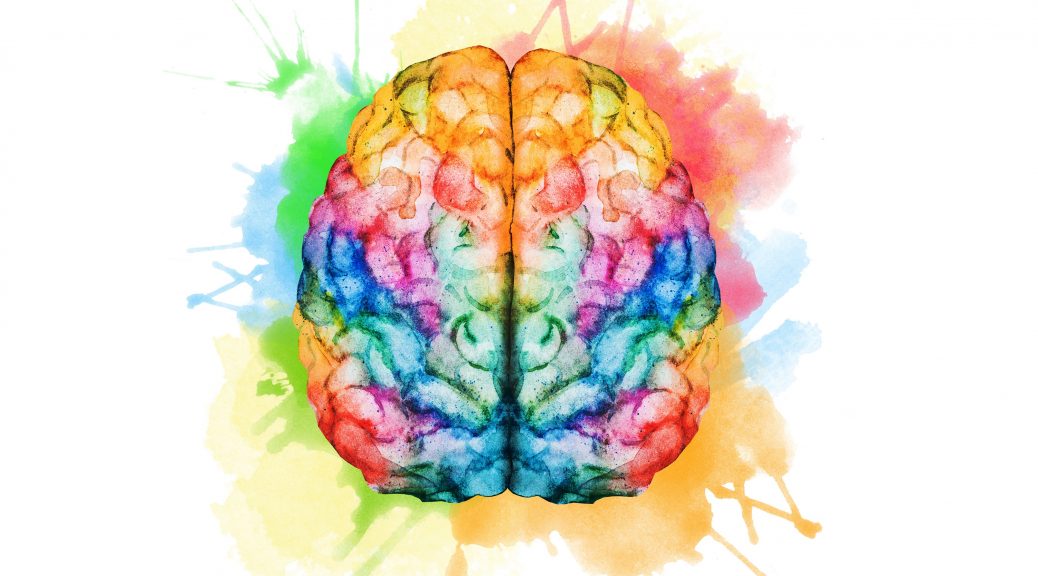
Mind Matters
We discover the natural remedies that support brain health and function.
“We know that brain health naturally declines with age with the loss of cognitive health, amongst other things,” explains Isabelle Nunn, technical and commercial nutritionist at Kinetic Enterprises Limited, “One of the biggest concerns is the rise in brain health conditions such as Alzheimer’s disease and the earlier onset of the condition as well.
“Key motivators for supporting brain health and function should not only come to mind when starting to suffer from memory loss or knowing a relative or friend going through a major illness or chronic disease related to health, but rather to remember that a healthy mind and a healthy body go hand-in-hand.”
Omega-3 and 6
According to research, essential fatty acids such as omega-3 and 6, help improve brain function, memory and the ability to learn new things, as well as promote normal brain growth and development.
“Omega-3 is naturally highly concentrated in the brain and is important for cognitive and behavioural health. Omega-3 supplements help to protect the brain and reduce the levels of inflammation. Research has shown that omega-3 deficiency contributes to depression and mood swings, poor circulation, fatigue, poor memory, dry skin and heart problems,” comments Nunn.
“With a rise in diets causing an imbalance in our ratio of omega-3 to omega-6 in the body, we have experienced a sharper rise in inflammatory health conditions which negatively impact brain health.”
If you are vegan or vegetarian, Nunn recommends consumption of flaxseeds: “Obtain your omega-3 dose from Barlean’s organic, non-GMO and cold-pressed Flaxseed Oil. Flaxseeds are high in ALA which is then converted to EPA and DHA, those found in oily fish. Barlean’s also offer an Omega Flax Swirl ideal for those avoiding fish, and comes in a delicious banana and smoothie flavour that is suitable from the age of 4 and for the whole family.”
Try these:
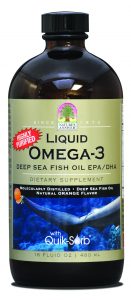 Nature’s Answer – Liquid Omega 3 provides the brain with essential fatty
Nature’s Answer – Liquid Omega 3 provides the brain with essential fatty
acids derived from oily fish, free from toxins and purifies. This oil naturally provides essential omega-3 fatty acids, including EPA and DHA.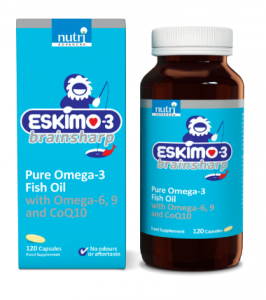
Nutri Advanced – Eskimo-3 Brainsharp has been specially formulated to help support cognition, memory and brain health. It contains omega-3, omega-6 and omega-9 fatty acids, as well as vitamins D and E and coenzyme Q10.
B Vitamins
Many of the B-complex vitamins play key roles in supporting brain health and have been shown to help memory loss and reduce the risk of dementia.
“B vitamins play an important role, with the most important ones being B1, B6, B12 and folic acid (B9),” explains Nunn. “B vitamins are found abundantly in the nerve and brain tissues. They all work in synergy. The metabolism of B9 for instance is highly dependent on other B vitamins and a deficiency of those is often associated with developmental problems in children. Supplementation with particular B vitamins, such as folic acid, have shown to improve memory within eight weeks.”
Vitamin B6, B12 and B9 are involved in the methylation cycle, which is important for DNA repair, reducing inflammation, immune response, detoxifying hormones and heavy metals.
“B12 has been proven to help reduce tiredness and fatigue as well as aiding concentration and memory,” explains Bethany Haley from BetterYou, “Symptoms of B12 deficiency include low energy, tiredness and loss of both appetite and weight, nerve problems and depression.”
She recommends supplementing to ensure an adequate intake: “Vitamin B12 is also notoriously difficult to absorb by the gut, and deficiencies in it have been linked to a host of neurological disorders. B12 is naturally found in our diet in meat, fish and dairy products. This means vegans and vegetarians may struggle to get an adequate daily intake, however, they are not the only ones that may struggle to achieve healthy B12 levels. In fact, vitamin B12 is so difficult to absorb that only one percent of intake from food is retained.”
Try these:
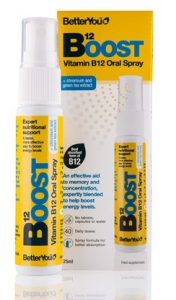 BetterYou – B12 Boost Oral Spray uses the most bio available form of B12
BetterYou – B12 Boost Oral Spray uses the most bio available form of B12
(Methylcobalamin), which is a naturally active form found within human metabolism meaning it is processed faster by the body than most other forms found in supplements.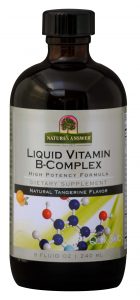
Nature’s Answer – Liquid Vitamin B-Complex provides nutritional support in an easily absorbed form. A high potency complex with thiamin (vitamin B1), riboflavin (vitamin B2), vitamin B6 and vitamin B12.
Vitamins A, C & E
“Vitamins A, C and E help protect our brain cells from oxidative damage,” explains Nunn. “Vitamin C is also important in the synthesis of dopamine, an important brain chemical for brain health. Water soluble vitamins like vitamin C need to be constantly replaced as we lose them so easily.”
Vitamin C is essential for the production of neurotransmitters too. Your brain has over 100 billion neurons which communicate with each other via brain chemicals called neurotransmitters – which impact on your ability to focus, concentrate and remember.
Try these:
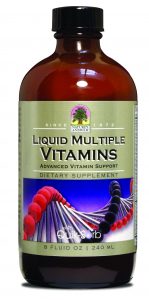
Nature’s Answer – Liquid Multiple Vitamins. This formula supplies a complete group of essential vitamins including key antioxidants, in a highly absorbable form. Quick-Sorb is an exclusive blend of herbs known to enhance delivery of nutrients to the body.
Magnesium, Zinc, Selenium & Calcium
“Minerals such as selenium, magnesium, calcium and zinc all play important roles in brain health. Deficiencies of which have been found to be linked to neurological and psychological impairments,” said Nunn.
“Calcium in particular plays a central role as a messenger between our nerve cells in the brain. Low levels of this mineral is rare since we do have a reservoir in our bones, but some things in life, such as particular medications, can cause our levels of calcium to become depleted. Magnesium and calcium work together in the brain.
“The levels of magnesium are also important for the conversion of B vitamins to their active forms in the brain, and have been found to improve working and long-term memory when supplementing aged rats in a study. Magnesium is also nature’s tranquilliser, and may be useful for those feeling stressed and overwhelmed to help calm the mind.”
Try these:
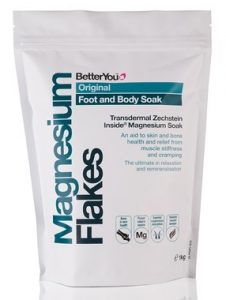
BetterYou – Magnesium Flakes when dissolved in a body or foot bath the solution feeds every cell and efficiently replaces magnesium. It contains Zechstein Inside® magnesium chloride, the purest known source that has been naturally condensed and purified for over 250 million years. Every 100g of Magnesium Flakes delivers 12g of elemental magnesium.
Gingko Biloba
“Research shows the benefits of gingko biloba to be both anti-inflammatory and antioxidant with circulation boosting and platelet forming effects. Gingko biloba has been studied for many years, and seems to protect the brain against damage to the mitochondria – our powerhouse of cells in the brain involved with energy production. The antioxidant properties come from its natural compounds; flavonoids and terpenoids, which may help with the progression of age related diseases by combating oxidative stress that usually worsens with age. Gingko’s ability to support mental focus, memory and clarity, while reducing the signs of cognitive decline in conditions like Alzheimer’s disease, has been praised for years,” commented Nunn.
Rebekah Towle from A.Vogel adds: “Although most dementia trials focus on ginkgo’s effects on the cognitively impaired, some look at its effects on people with no history of neurocognitive dysfunction. In this trial, 262 patients with no history of dementia or significant neurocognitive impairment were given a series of neuropsychological tests immediately prior to the initiation of ginkgo or placebo treatment, which lasted for six weeks. They were then tested again, and the active group showed significantly more improvement on tasks involving delayed free recall, delayed recognition of visual material and recognition of noncontextual, auditory-verbal material, than the control group. Overall, the results showed the potential effect of ginkgo in enhancing certain neuropsychological/memory processes of cognitively intact, older adults.”
Try these:
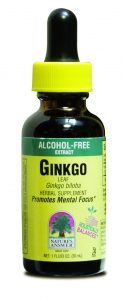
Nature’s Answer – Gingko herbal extract by provides you with a high potency,
alcohol free herb that is holistically balanced as mother nature intended.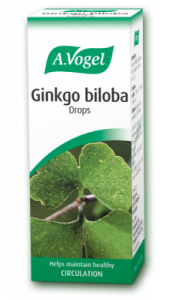
A.Vogel – Ginkgo Biloba Drops the fresh green leaves of the ginkgo biloba tree are
gathered in spring to create this beneficial tincture.
Lifestyle Changes
There are a number of lifestyle changes that can further support brain health and function. Nunn offers her top tips:
- Aerobic exercise: Research shows that staying active cuts the risk of developing Alzheimer’s disease by 40% and that exercise helps to create new cells in the hippocampus, an area of the brain involved with memory.
- Good sleep: The brain does not go to sleep as some might think; instead parts of the brain are several times more active at night during those precious hours of sleep. During a process referred to as the ‘glymphatic drainage system’, the brain is cleared of toxins and one of the proteins that gets recycled during the process has been found to be involved in developing amyloid plaque, the hallmark of Alzheimer’s disease.
- Reduce stress: Chronic stress contributes to inflammation and abnormal protein deposits in the brain. Research shows that stress contributes to higher levels of cortisol and this in turn suppresses nerve cell growth and the connectivity between nerve cells. That connectivity is important to brain health and memory which is a huge concern amongst middle aged adults.
- Diet: A good diet is important to feed the brain, one packed with healthy fats and antioxidants. Antioxidants can come from colourful fruits and vegetables and while keeping up with the intake of those, we must make sure to cut down on the intake of saturated fats and sugars.
- Brain challenge: As we know, the brain has the ability to generate new cells and connections, and challenging the brain helps keep it stimulated to do so. The more mental reserves we build up throughout our lives, the better our ability to delay age-related decline in mental cognition. Activities can involve reading a book, puzzles or brain teasers but also learning new skills such as learning to play an instrument or a new language, both of which can be a way of increasing neural pathways and keep our brains healthy.